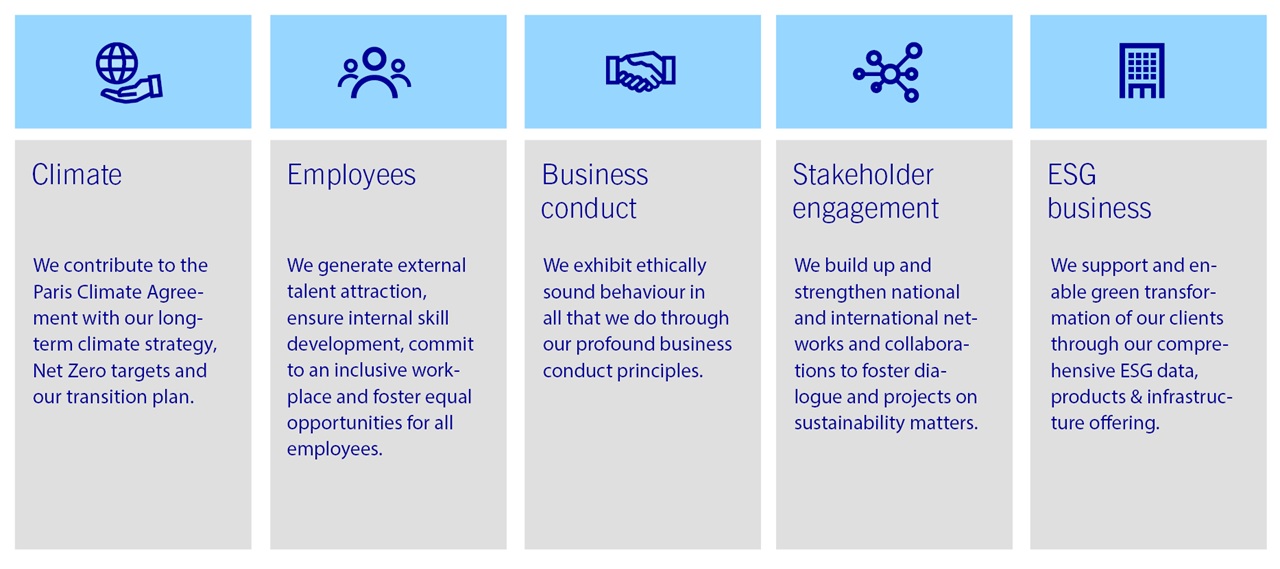Executive Board
Supervisory Board
Remuneration
Auditor
Declaration of Conformity
Articles of Incorporation
Compliance
Master Data
Key Figures & Dividend
Analysts
Shareholder Structure
Share Buy-back
Bonds
Credit Ratings
Media Releases
Ad-hoc Announcements
Managers’ Transactions
Notifications of Major Holdings
Other Regulatory Announcements
Sign-up Service
Allfunds Offer
Sustainability Strategy
ESG Governance
Reports, Statements, Policies & Guidelines
Inclusion & Equal Opportunities
Contact
Climate
Employees
Corporate culture: fostering openness
We support a culture of open dialogue, trust and mutual acceptance within our diversity. We strive to foster a healthy and productive work environment where everyone feels welcome to freely contribute their ideas, talent and expertise.
Human rights: practising respect
We endorse the Universal Declaration of Human Rights of the United Nations, participate in the UN Global Compact and support the labour standards of the International Labour Organization (ILO). Its principles are implemented in our Group-wide compliance policies, in our code of business conduct as well as in our Statement on Human Rights.
Diversity: promoting and using individuality
We place great importance on the targeted promotion of women – which is why we have committed ourselves to specific goals with respect to the proportion of women in management positions. In addition to the gender aspect, age, health impairment, sexual identity, ethical affiliation and beliefs of our employees are also central criteria of our diversity management.
Recruiting: attracting employees of distinction
As one of the world’s leading exchange organisations, we offer highly qualified applicants ideal conditions to develop their expertise, creativity and commitment.
Personnel development: growing together
We want to empower all colleagues to take responsibility for their own growth opportunities. Besides specific development measures, the majority of development happens on the job – with new tasks, project assignments and collaborative work. Next to specific skill and leadership trainings, Deutsche Börse Group offers two dedicated talent programmes for internal employees:
Our High Potential Programme promotes personal growth and professional development. Participants follow a fixed curriculum in a 12-month learning journey including different trainings focusing on a variety of topics, such as effective communication, negotiation & conflict management as well as the basics of project management styles and (self-) leadership. In addition, voluntary development services and different networking events are part of the programme.
The ada Fellowship prepares our employees for digital transformation and empowers them to act as digital ambassadors for the company. Led by the ada team and their experienced partners from the digital education sector, the fellows undergo an interdisciplinary, 12-months programme. The experience is based on widely differing formats: events and interactive elements with digital bohemians, monthly online deep dives into core topics and working sessions. At live events, the fellows have the opportunity to learn from the leading personalities and designers of tomorrow's world.
Remuneration: rewarding performance
We reward performance in a variety of ways. In addition to their fixed salary, and under certain conditions, employees are eligible for a variable bonus. On top of that, we offer long-term remuneration components and – compared with other companies in the financial services sector – above-average social benefits, specific to each location.
“Job, Life & Family”: promoting flexibility and balance
With flexible working hours, options for flexible working locations, programmes for child care and care for the elderly as well as for active preventative health care, we help employees balance their personal and working lives.
Social engagement
As a company, we assume an ethical and legal responsibility as part of our business activities. We also bear an obligation beyond this realm towards the environment in which we operate. Socially responsible companies give back to society. We strive to live up to this standard by supporting charitable causes and creating positive social value in collaboration with our experienced partners. In doing so, we consider our corporate responsibility to be an ongoing obligation towards our shareholders, customers and employees, as well as towards greater society.
Business Conduct
Stakeholder Engagement
ESG Business

Sign Up for Our Media Releases
- Simple and free registration
- Choose the business areas that interest you
- Delivered straight to your inbox
SIGN ME UP






















